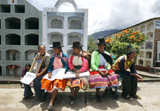Forensic experts began excavating a mass grave on Monday to recover and identify the remains of some 50 people believed to have been killed by soldiers nearly 25 years ago in a dirty war against Maoist guerrillas.
About 200 relatives of the victims gathered at the town cemetery, chanting “We demand justice,” as the exhumation began on orders of the local prosecutor’s office.
A lawyer for the relatives, Karim Ninaquispe, said the victims went missing in July and August of 1984 in this remote town 550km southeast of Lima in Ayacucho, Peru’s poorest province and the birthplace of an insurgency by the Shining Path, a Maoist group.

PHOTO: AP
They were taken to Huanta’s municipal stadium, where the Peruvian navy had established a base, she said.
“In that place they were tortured, executed and their bodies were later made to disappear,” she said.
“There is sufficient evidence to affirm that those who disappeared between July and August of 1984 are the ones in this cemetery,” she said.
Among those believed to be buried there was journalist Jaime Ayala Sulca, who had reported on the disappearance of peasants in the region at the hands of the military.
One peasant woman, Juana Paredes, said that her husband Cirilo Barboza Sanchez was also among the victims whose tortured bodies ended up in the mass grave.
“They arrested him without charge and took him to the stadium, where they tortured and killed him,” she said between sobs. “Someone told me that they then put his body in a bag and buried him here.”
One man, Maximiliano Lopez Medina, recalled how his sister, Graciela, was taken by force in July 1984, never to be seen again. His story mirrored one told by Teresa Araujo Quispe about the disappearance without a trace of her husband, Victor Huamannaupa.
“I hope that I find his remains here so that I can give him a Christian burial and so that finally, after all this time, I will be able to sleep peacefully again,” she said.
The exhumation is the first of its kind this year by authorities investigating crimes committed during the 1980 to 2000 internal war.
Forensic experts will take DNA samples from the remains and hope to identify them by the end of the year.
Peru’s Truth and Reconciliation Commission estimates that there are more than 4,000 secret graves holding victims from the conflict. Nearly 70,000 people were either killed or went missing during that period, government figures showed.
The commission concluded in a 2003 report that those buried in Huanta were victims of a massacre perpetrated by the Peruvian military.

VAGUE: The criteria of the amnesty remain unclear, but it would cover political violence from 1999 to today, and those convicted of murder or drug trafficking would not qualify Venezuelan Acting President Delcy Rodriguez on Friday announced an amnesty bill that could lead to the release of hundreds of prisoners, including opposition leaders, journalists and human rights activists detained for political reasons. The measure had long been sought by the US-backed opposition. It is the latest concession Rodriguez has made since taking the reins of the country on Jan. 3 after the brazen seizure of then-Venezuelan president Nicolas Maduro. Rodriguez told a gathering of justices, magistrates, ministers, military brass and other government leaders that the ruling party-controlled Venezuelan National Assembly would take up the bill with urgency. Rodriguez also announced the shutdown

Civil society leaders and members of a left-wing coalition yesterday filed impeachment complaints against Philippine Vice President Sara Duterte, restarting a process sidelined by the Supreme Court last year. Both cases accuse Duterte of misusing public funds during her term as education secretary, while one revives allegations that she threatened to assassinate former ally Philippine President Ferdinand Marcos Jr. The filings come on the same day that a committee in the House of Representatives was to begin hearings into impeachment complaints against Marcos, accused of corruption tied to a spiraling scandal over bogus flood control projects. Under the constitution, an impeachment by the

Exiled Tibetans began a unique global election yesterday for a government representing a homeland many have never seen, as part of a democratic exercise voters say carries great weight. From red-robed Buddhist monks in the snowy Himalayas, to political exiles in megacities across South Asia, to refugees in Australia, Europe and North America, voting takes place in 27 countries — but not China. “Elections ... show that the struggle for Tibet’s freedom and independence continues from generation to generation,” said candidate Gyaltsen Chokye, 33, who is based in the Indian hill-town of Dharamsala, headquarters of the government-in-exile, the Central Tibetan Administration (CTA). It

A Virginia man having an affair with the family’s Brazilian au pair on Monday was found guilty of murdering his wife and another man that prosecutors say was lured to the house as a fall guy. Brendan Banfield, a former Internal Revenue Service law enforcement officer, told police he came across Joseph Ryan attacking his wife, Christine Banfield, with a knife on the morning of Feb. 24, 2023. He shot Ryan and then Juliana Magalhaes, the au pair, shot him, too, but officials argued in court that the story was too good to be true, telling jurors that Brendan Banfield set